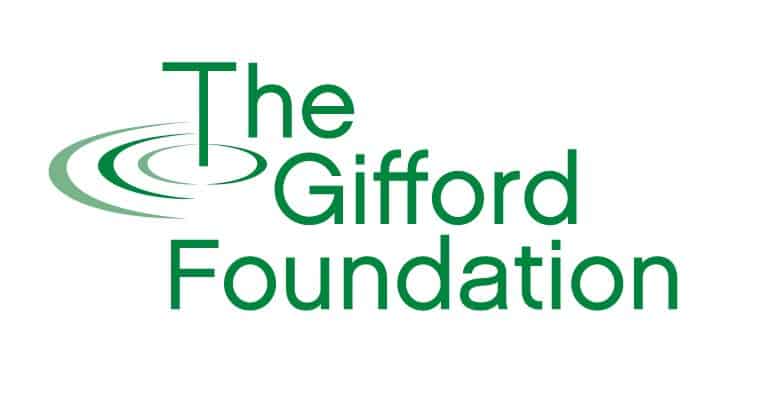Overcoming Fear of the Unknown
By recognizing people’s fear of the unknown, Sheila Austin has created systems that build trust and compassion between staff and participants. She helped found Road to Emmaus Ministry of Syracuse more than a decade ago, and continues to serve as its President.
Published August 11th, 2022
For much of her life, Sheila Austin was deeply afraid of Syracuse’s South Side and the people who live there. So much so, that she would take long, circuitous routes to avoid even driving through the neighborhood. Fast forward to the present, where she happily works within that community six days a week. She knows the streets, the buildings, and is on a first name basis with many residents. “I feel like I’m home,” she says as she puts her blinker on and turns onto South Salina St.
Austin’s personal evolution has not only transformed her own life, but has revealed important lessons that fundamentally impact the way in which services are delivered at her agency, Road to Emmaus Ministry of Syracuse. By recognizing people’s fear of the unknown, she has created systems that build trust and compassion between staff and participants.
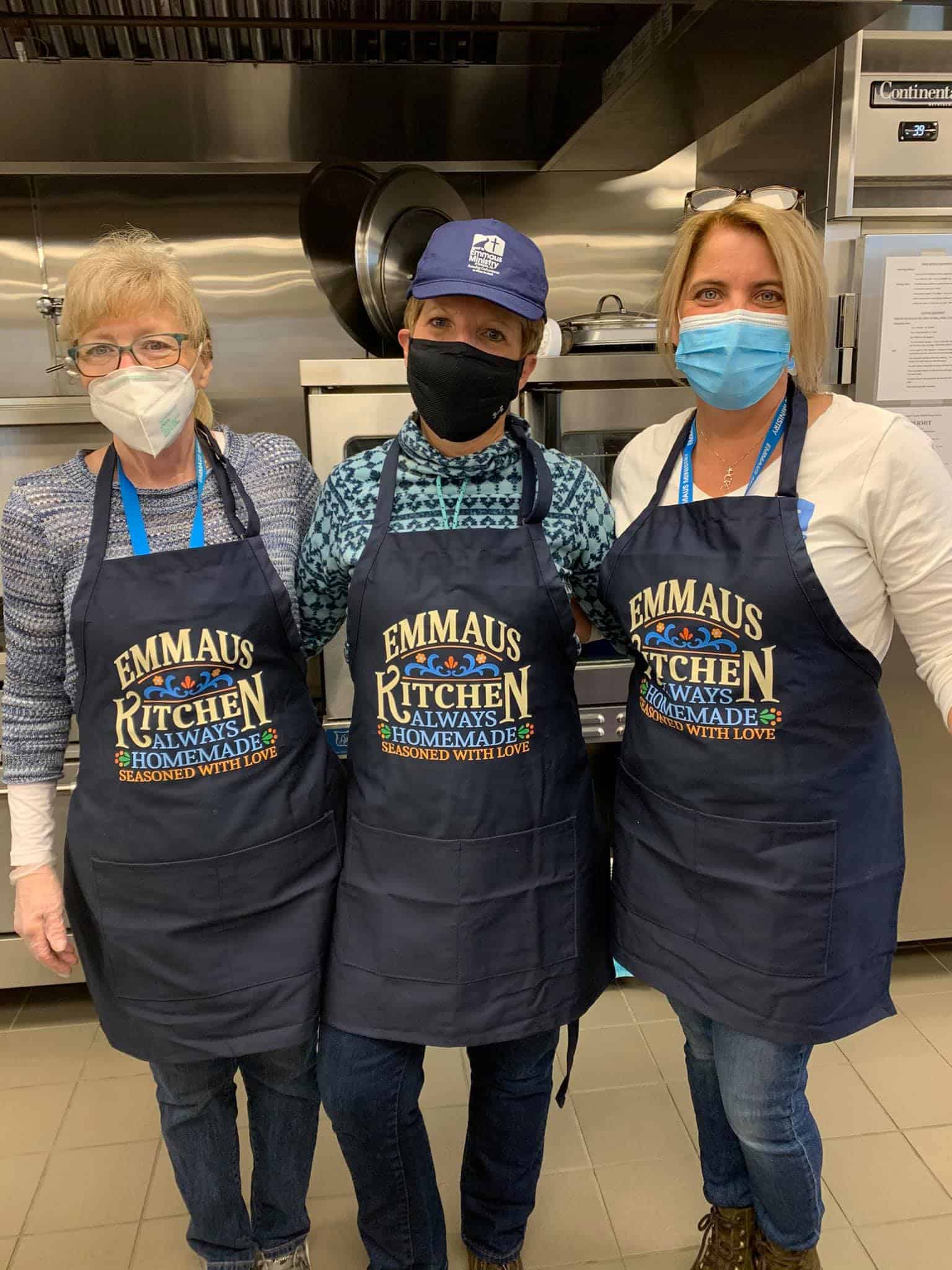
Staff at Road to Emmaus Ministry of Syracuse served 57,000 hot meals last year, up from 34,000 in 2020. This summer, they will be opening up a free medical and dental clinic.
When Sheila Austin describes the first half of her life, and the events that led up to the work she does today, you almost get the feeling that she is describing another life altogether. She grew up in North Syracuse in a military family. Following her mother’s advice, she earned her degree in nursing and worked as a Registered Nurse before eventually marrying an anesthesiologist who worked at a local hospital. Over time she became more and more involved in her church, learning to sing in their choir and volunteering to assist with various church functions.

An attorney from the Onondaga County Volunteer Lawyers Project provides pro bono legal advice. Through partnerships with other regional nonprofits, Road to Emmaus has been able to greatly expand the scope of services available at their center.
One day while volunteering at her church in 2009, she was approached by a priest by the name of Father Manno who had recently been assigned to their parish. He thanked her for her help, but took the opportunity to voice some concerns about the nature of their service. “I see you are doing all of this work for the people who come here, but what are you doing for the people outside of the congregation?”
Austin explained how they prepared sandwiches which were then dropped off at the Syracuse area Catholic Charities men’s shelter. “What do you know about the people who receive the sandwiches?” asked the priest. Austin explained she didn’t know anything about them because they just dropped off the sandwiches and never met the people actually eating them. Father Manno suggested that that should be her next step. “Go out and engage and encounter the people you are trying to serve.”
This posed a challenge. The priest’s words had moved her, and Austin felt an urgency to adopt a more direct form of service and build a connection with the people receiving assistance. Yet this also meant traveling outside of her comfort zone in a very literal sense. “I had a major fear of the South Side of the City. I never drove on South Salina St. I always made a big loop around to avoid it. I never had had a bad experience there but I always thought it was not a safe neighborhood and not the place for me to be.”
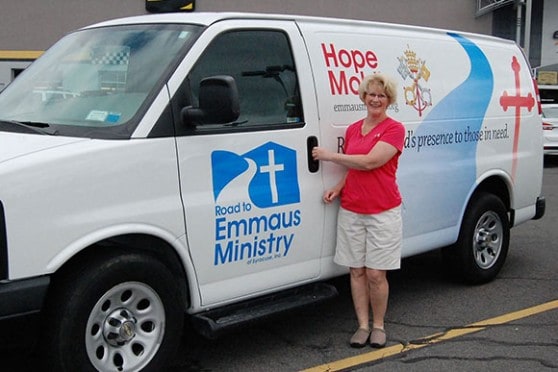
Founder and President Sheila Austin stands next to a Road to Emmaus outreach van which helps engage Syracuse residents who live outside of walking distance from the center.
To overcome her anxiety, she developed a plan to gradually learn the neighborhood one street at a time. “This was a big challenge for me. I would start at the church, and go up one block to the next intersection, and then head back. The next day I would do the same thing but one block further. It took a long time to finally get used to driving all the way to where I needed to go.” Before long, she began to recognize the people, buildings, signs, and other landmarks that she would pass while driving. As she began to learn the neighborhood, her anxiety began to dissipate. “I realized it’s what we’re not familiar with that we are most afraid of. That helped me tremendously.”
This would mark the beginning of a decade long process of expanding their services to better address the needs of the community they were serving. Time spent talking to participants at the men’s shelter motivated Austin and the other volunteers to expand their meal service to include hot meals. Soon they had added hygiene services like haircuts and washing the feet of the homeless. A service was established to help participants contact estranged relatives.
To keep up with their expanding scope of services, Austin and several other partners formed their own registered nonprofit – Road to Emmaus Ministries of Syracuse. They developed an active fundraising arm and acquired a dedicated space to deliver their growing suite of services. But just as Austin and the other volunteers were apprehensive about the neighborhood in the beginning, they understood that earning the trust of the community would not happen overnight.
“They didn’t know us, and so we knew we needed to be patient. You have to be ready to commit totally. You can’t say, ‘we’re going to be open on a Tuesday and a Wednesday, and closed the rest of the time,’ because they see right through you. But now that we have been here for four years, meeting the food needs of those who come to us, they are coming to us with those other important needs in their life.”
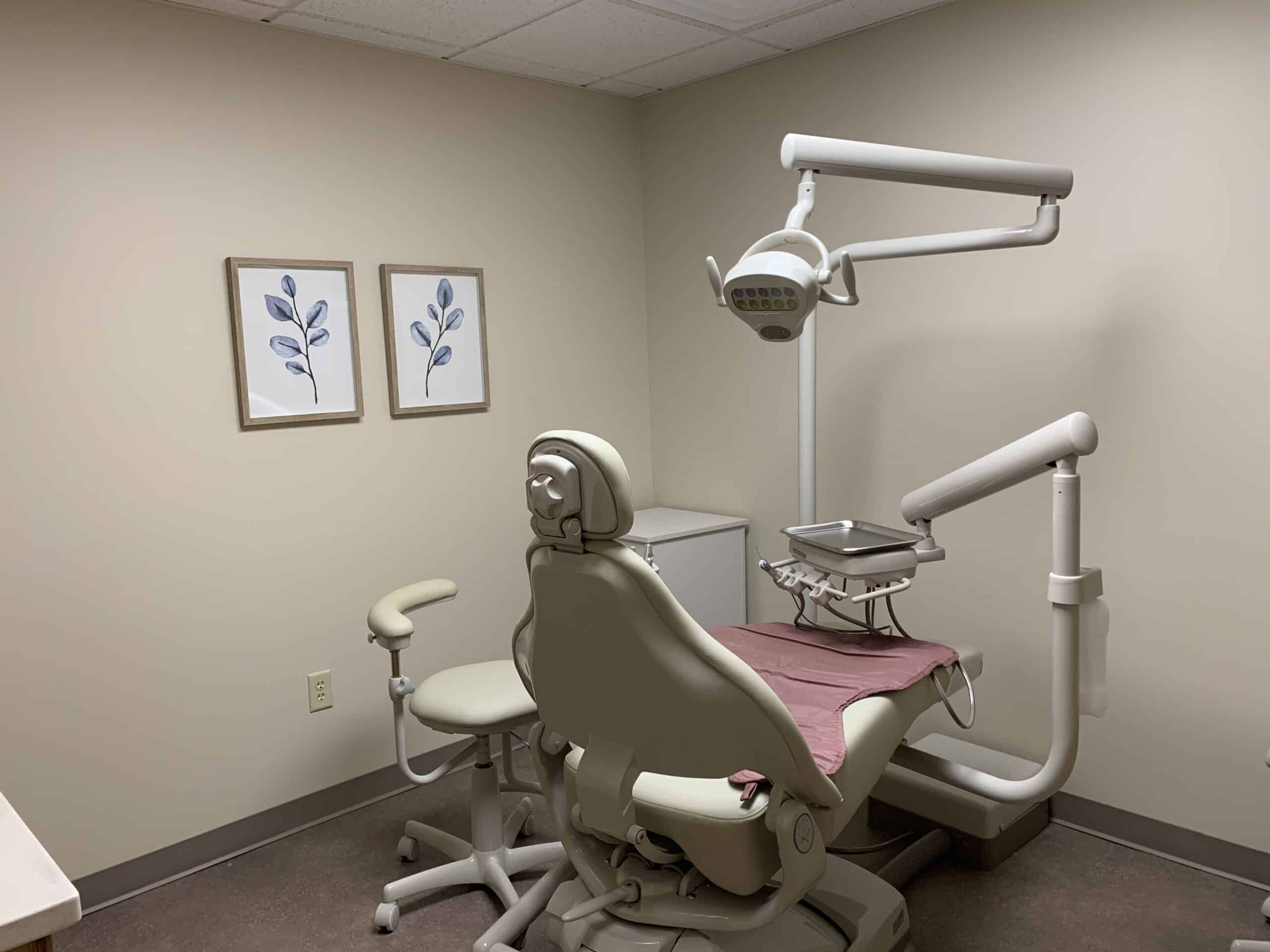
A Gifford grant helped support the construction of a hygienist suite at Road to Emmaus’s new dental clinic which will open this summer.
Austin explains that if a person is hungry, finding food will always be their first priority. But once that has been satisfied, they have the attention and energy to direct towards other challenges in their lives.
Today, Road to Emmaus Ministries is operating on a scale that bears little resemblance to its humble origins making sandwiches for the men’s shelter. In 2021 alone, they served 57,000 hot meals to neighborhood residents – up from 34,000 meals the year before. Their center has partnered with other CNY nonprofits to offer vision and hearing screening, transportation assistance, pro bono legal consulting, school supplies, and much more.
This summer they are preparing to open a free dental clinic and medical clinic which will be operated by a network of volunteer doctors, dentists, nurses, and other professionals. The project also engaged a broad cohort of supporters ranging from private foundations to individual contributors, representing a total investment of more than $1.2 million in fundraising revenue. A grant from The Gifford Foundation helped support the construction of one of the hygienist suites within the center. Once complete, it will be the only free clinic of its kind in the Syracuse area. “For many participants, it has been a long time since they have gone to the dentist. For some it will be their first time. So there is going to be a lot of anxiety. And some have had bad experiences in the past, so we want to help them have a good experience this time.”
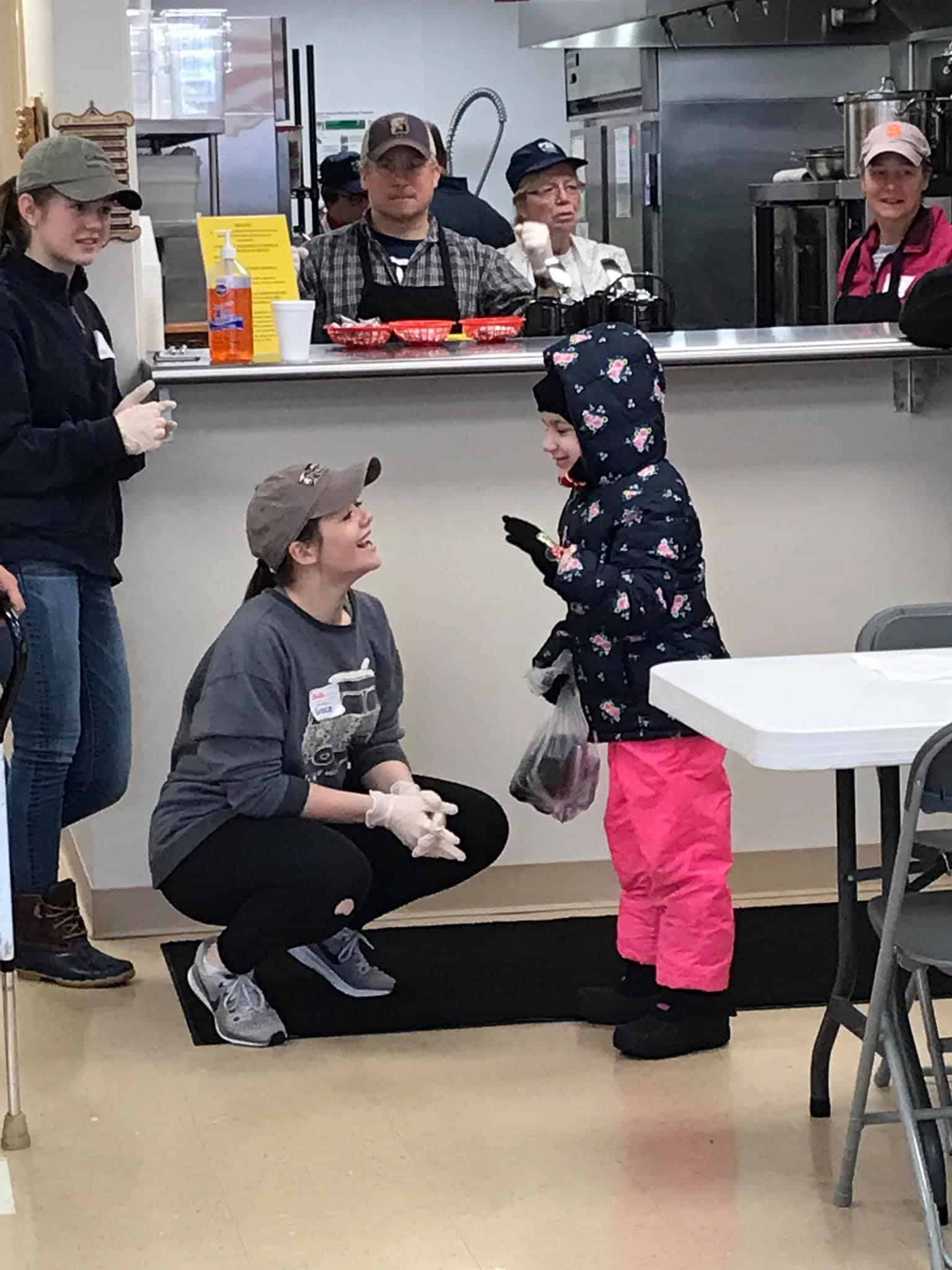
A Road to Emmaus volunteer distributes school supplies and other materials to children during a pancake breakfast event.
Creating the conditions for that “good experience” meant doing as much as possible to eliminate the unknowns around the process. “Let’s say somebody is coming in for lunch and we know they are scheduled for a dental appointment the next day. We can take that opportunity to remind them where to go, when to be there, and what to bring.” They explain that someone will sit with them beforehand and help with any questions or paperwork prior to the appointment. “If they want,” says Austin, “that volunteer will stay with them through the whole journey. They can go into the treatment room with them. It’s all about having someone there that they feel comfortable with, that they trust.”
A guiding force behind their operations is the philosophy of meeting people where they are. “We have to address what that need is at that time for them. It’s not a time for educating them and saying, ‘you have to do this, you have to do that’, you just have to be present. Just being present for whoever shows up in whatever condition with whatever need. It’s honoring them as a human being, with value, as you would honor someone that you love.
“It’s easy to be kind and compassionate to people that are like us, that are in our world. But we have to recognize that the people that we serve in community service are just as significant.” says Austin as she reflects on how her own attitudes about Syracuse’s South Side neighborhood have evolved over the past 15 years. “It’s family. I feel like I’m home. It’s familiar, I know the people, and I’m comfortable here. I’m probably more comfortable here now than I would be in my old life.
“Don’t get me wrong, I had wonderful friends and I still do. But it was always centered around the next golf game, the next dinner, the next cocktail party – ‘are you going that one?’.” She paused and let out a sigh. “It’s doesn’t go very deep for long. But this does.”
